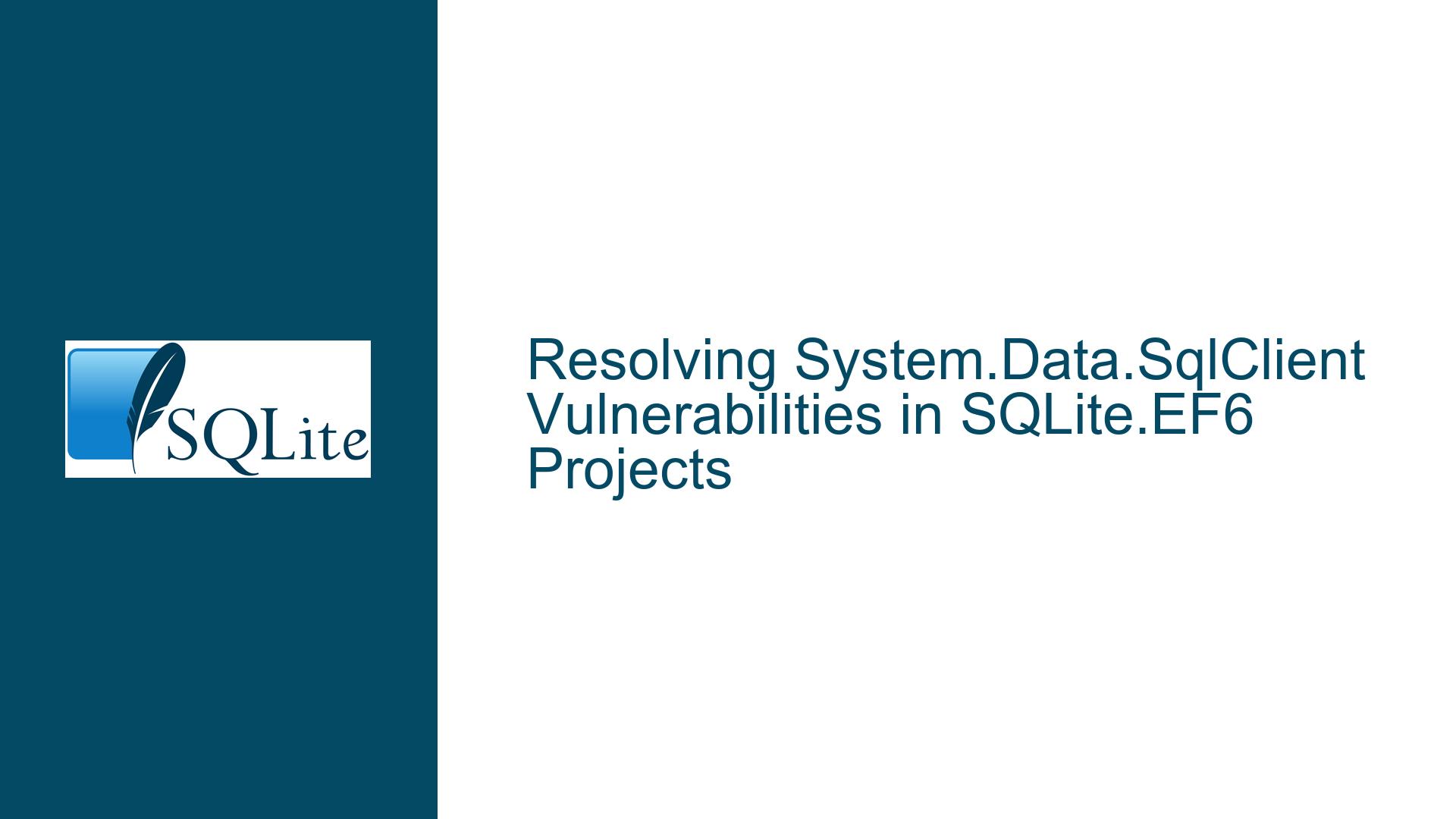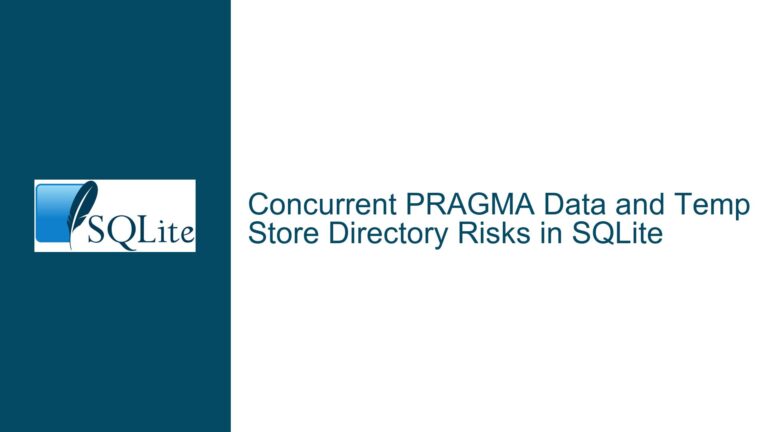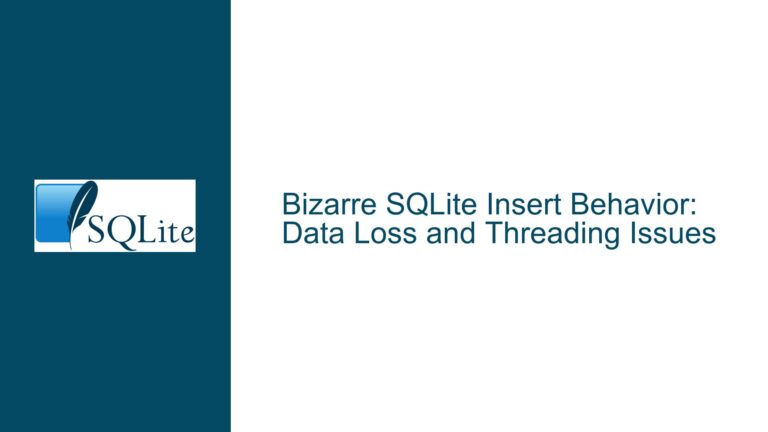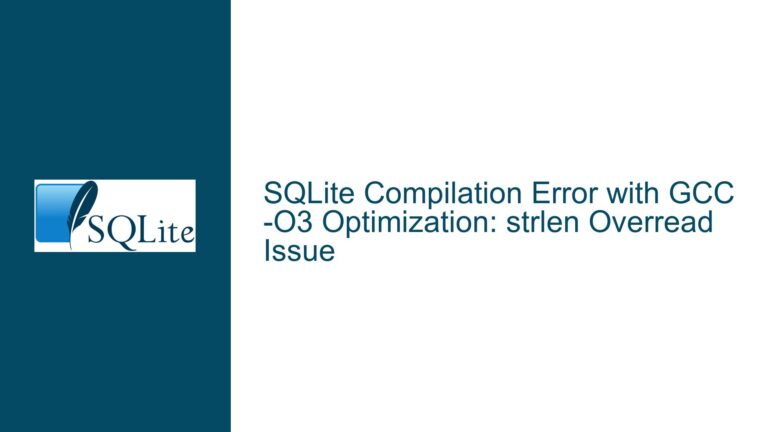Resolving System.Data.SqlClient Vulnerabilities in SQLite.EF6 Projects
Security Vulnerability Warnings in Visual Studio Due to Outdated System.Data.SqlClient Dependency
The core issue revolves around security vulnerabilities introduced into projects using System.Data.SQLite.EF6 version 1.0.119 due to its dependency on System.Data.SqlClient version 4.8.1, which has known security flaws. When developers integrate SQLite via this Entity Framework 6 (EF6) provider, Visual Studio’s NuGet package manager or security scanners flag the project as vulnerable because System.Data.SqlClient 4.8.1 lacks critical patches present in later versions like 4.8.6. This creates compliance risks, exposes applications to exploits, and disrupts development workflows with persistent warnings. The problem is exacerbated when projects are bound to organizational security policies that block deployments until dependencies meet minimum security standards.
System.Data.SQLite.EF6 is a NuGet package enabling Entity Framework 6 support for SQLite databases. Its dependency on System.Data.SqlClient—a .NET data provider for SQL Server—stems from legacy design choices where SQLite’s EF6 provider reused components from the SQL Server stack for abstractions like connection pooling or transaction management. However, System.Data.SqlClient versions prior to 4.8.6 contain vulnerabilities such as improper certificate validation (CVE-2023-21538) or SQL injection risks in specific scenarios. Even though SQLite itself isn’t affected by these flaws, the mere presence of a vulnerable System.Data.SqlClient assembly in the project triggers security tools.
The mismatch between SQLite.EF6’s dependency tree and modern security requirements forces developers into a dilemma: either tolerate the warnings (and associated risks) or abandon SQLite.EF6 for alternative solutions. This issue is particularly acute in regulated industries like healthcare or finance, where audit tools automatically reject builds with outdated dependencies.
Root Causes of Dependency Chain Vulnerabilities in SQLite.EF6 and System.Data.SqlClient
The primary cause of this issue is the transitive dependency mechanism in NuGet combined with the SQLite.EF6 package’s pinned reference to an outdated System.Data.SqlClient version. When a project installs System.Data.SQLite.EF6 1.0.119, NuGet automatically resolves and installs System.Data.SqlClient 4.8.1 as a downstream dependency. The SQLite.EF6 package explicitly specifies this version in its nuspec file, locking it to 4.8.1 regardless of newer patches. This occurs because the package maintainers have not updated the dependency metadata to allow compatibility with System.Data.SqlClient 4.8.6 or higher.
Another contributing factor is the decoupling of security updates from package versioning. System.Data.SqlClient 4.8.1 to 4.8.6 includes backward-compatible security patches, but NuGet treats these as distinct versions. Unless SQLite.EF6’s maintainers relax the version constraint to accept 4.8.x, NuGet cannot auto-upgrade to the patched version. This rigidity stems from Semantic Versioning (SemVer) practices where even minor version increments (e.g., 4.8.1 to 4.8.2) require explicit consumer approval.
Additionally, the historical design of System.Data.SQLite.EF6 plays a role. The package was created when System.Data.SqlClient was the default data provider for SQL Server, and its codebase shares abstractions with SQLite’s EF6 implementation. Over time, Microsoft shifted focus to Microsoft.Data.SqlClient, a modernized fork with active maintenance. However, SQLite.EF6 remains tied to the older System.Data.SqlClient, which receives only critical updates, creating a lag between vulnerability disclosures and dependency updates.
Finally, insufficient dependency isolation in .NET Framework projects exacerbates the problem. Unlike .NET Core’s runtime-specific package graphs, .NET Framework apps often load assemblies globally, causing all referenced packages—even those unused at runtime—to appear in security scans. Thus, even if SQLite.EF6 doesn’t invoke vulnerable code paths in System.Data.SqlClient, the assembly’s presence alone suffices to trigger alerts.
Mitigating and Resolving SQLite.EF6 Dependency Vulnerabilities Through Updates and Workarounds
To resolve this issue, developers must either update the dependency chain or isolate/remove the vulnerable assembly. Below are actionable steps:
1. Validate the Current Dependency Tree
Begin by inspecting the project’s NuGet dependencies. Use the Package Manager Console in Visual Studio to run Get-Package -ProjectName YourProjectName, focusing on System.Data.SQLite.EF6 and System.Data.SqlClient. Confirm that System.Data.SqlClient is pinned to 4.8.1. Cross-reference this with vulnerability databases like the National Vulnerability Database (NVD) to identify specific CVEs affecting 4.8.1.
2. Upgrade System.Data.SqlClient via NuGet
Attempt to manually install System.Data.SqlClient 4.8.6 using NuGet. If the SQLite.EF6 package permits it, NuGet will resolve the conflict by using the newer version. However, if SQLite.EF6 enforces a strict version constraint, this will fail. In such cases, edit the project’s packages.config file or .csproj to override the dependency:
<PackageReference Include="System.Data.SqlClient" Version="4.8.6" />
<PackageReference Include="System.Data.SQLite.EF6" Version="1.0.119" />
Rebuild the project and run comprehensive tests to detect breaking changes.
3. Migrate to Microsoft.Data.SqlClient
If compatibility allows, replace System.Data.SqlClient with Microsoft.Data.SqlClient, which is actively maintained and receives regular security updates. This requires:
- Uninstalling System.Data.SqlClient.
- Installing Microsoft.Data.SqlClient via NuGet.
- Adding assembly binding redirects in app.config or web.config:
<dependentAssembly>
<assemblyIdentity name="System.Data.SqlClient" publicKeyToken="b03f5f7f11d50a3a" culture="neutral" />
<bindingRedirect oldVersion="0.0.0.0-4.8.6" newVersion="4.8.6" />
</dependentAssembly>
Note that this is a stopgap measure and may not fully eliminate warnings if SQLite.EF6 internally references System.Data.SqlClient types.
4. Contribute to SQLite.EF6’s Dependency Update
If the SQLite.EF6 package is open-source, fork its repository, update its dependency to System.Data.SqlClient 4.8.6, and submit a pull request. Rebuild the package locally and test it in your project. If accepted, the maintainers will publish an updated NuGet package, resolving the issue for all users.
5. Suppress False-Positive Security Warnings
As a last resort, suppress the warnings in Visual Studio if the vulnerable code paths are confirmed unreachable. Add a Directory.Build.props file to your solution with:
<Project>
<PropertyGroup>
<NoWarn>NU1605;NU1608</NoWarn>
</PropertyGroup>
</Project>
This hides NuGet warning codes related to deprecated packages but should only be used temporarily.
6. Transition to Entity Framework Core
For long-term sustainability, migrate from Entity Framework 6 to Entity Framework Core (EF Core), which uses modernized SQLite providers without System.Data.SqlClient dependencies. EF Core’s Microsoft.EntityFrameworkCore.Sqlite package relies on pure .NET Standard libraries, eliminating legacy dependencies.
By systematically applying these steps, developers can neutralize the security risks while maintaining SQLite functionality. Prioritize dependency upgrades and community contributions to ensure ecosystem-wide resilience against similar issues.






